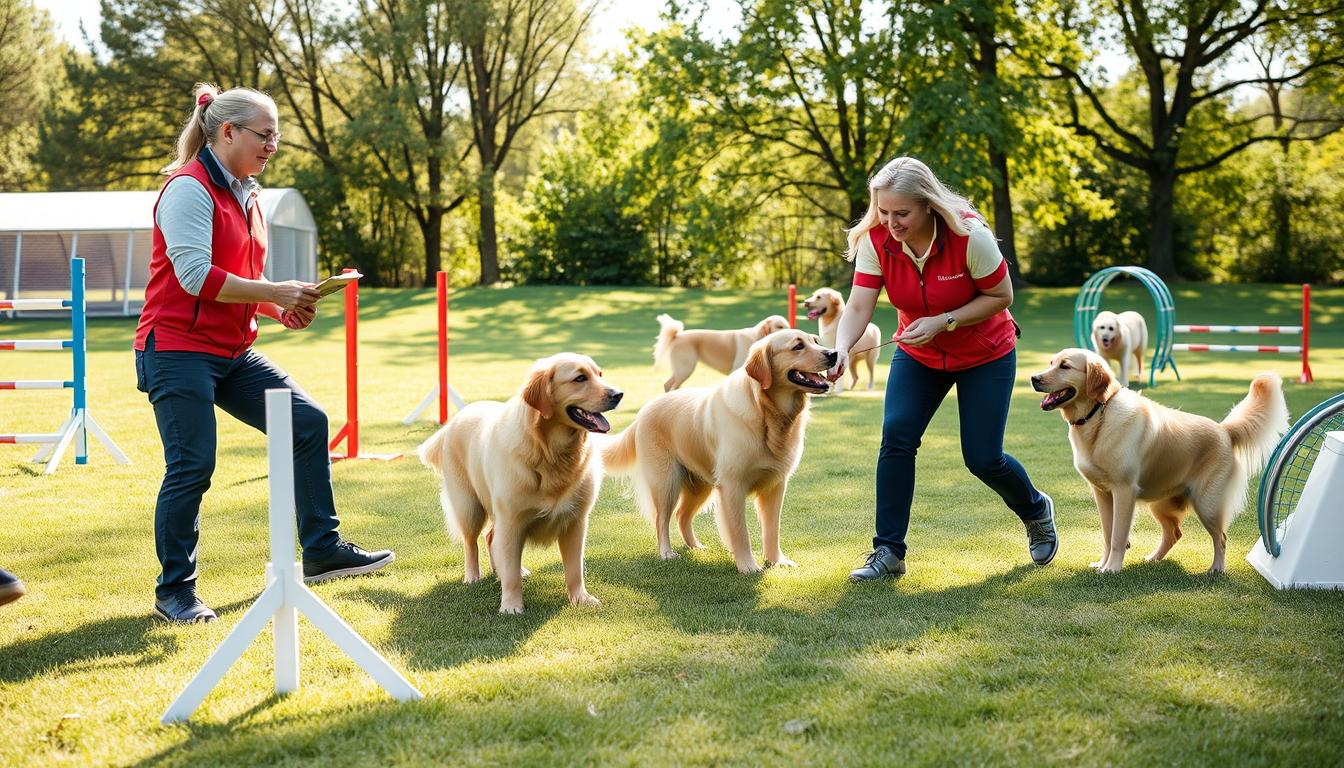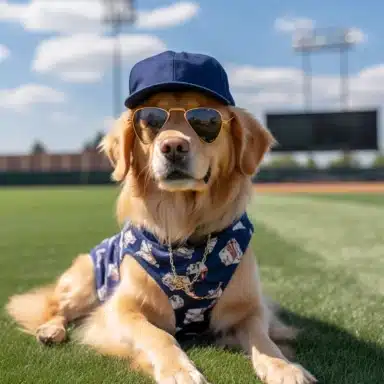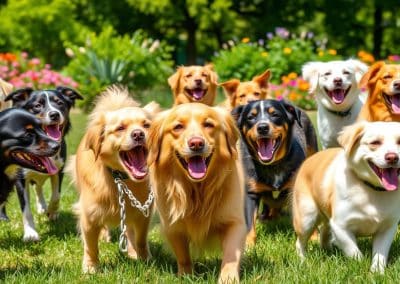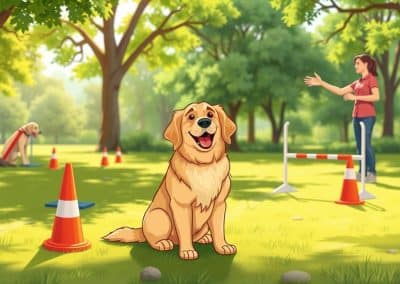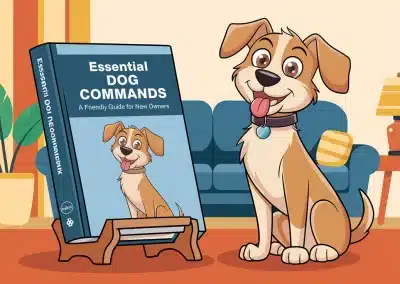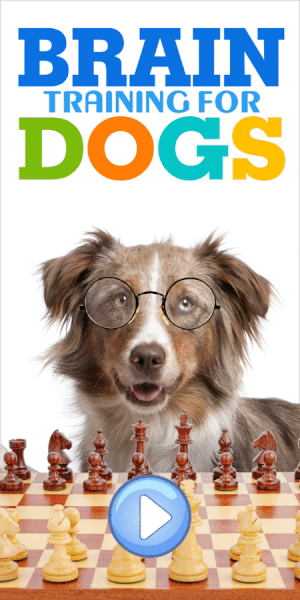Elite Trainers’ Secret Techniques for Golden Retrievers .Watching my Golden Retriever, Max, run in the park filled me with joy and frustration. His energy was contagious, but training him was tough. That’s when I found elite trainers and their special methods for Golden Retrievers. It was like discovering a treasure that changed our bond.
Elite trainers know how to connect with Golden Retrievers. They use their knowledge to build a strong bond between dog and owner. Learning these secrets helped me improve Max’s behavior and our relationship.
Getting to know these secret techniques was a challenge, but it was worth it. Elite trainers have spent years mastering their craft. They’re now sharing their expertise with dog owners like us. Their methods, from positive reinforcement to professional communication, have changed how we train Golden Retrievers.
Exploring elite dog training methods will amaze you. These techniques can solve common problems or take your Golden Retriever’s skills to new heights. The secrets of elite trainers are about to transform your experience as a dog owner.
Key Takeaways
- Elite trainers use specialized techniques tailored for Golden Retrievers
- Understanding canine psychology is crucial for effective training
- Advanced positive reinforcement methods yield superior results
- Professional communication strategies enhance the human-dog bond
- Behavioral modification techniques address common Golden Retriever issues
- Customized training programs cater to different life stages
Understanding Golden Retriever Psychology: The Foundation of Elite Training
Learning about golden retriever behavior is key to effective training. Experts say knowing canine psychology is crucial for lasting results. This knowledge helps owners communicate better and build strong bonds with their pets.
Reading Canine Body Language and Emotions
Golden retrievers show their feelings through subtle signs. It’s important to recognize these cues to understand their needs and emotions. Tail position, ear movement, and facial expressions all tell us about a dog’s mood.
Establishing Pack Leadership Dynamics
In canine psychology, pack dynamics are crucial. Being the pack leader makes your golden retriever feel secure. This means setting clear rules, communicating well, and showing confidence.
Building Trust Through Understanding
Trust is the base of a strong relationship. By knowing your golden retriever’s personality and needs, you can build a bond of respect and love. This trust is key for successful training and a peaceful home.
| Training Experience | Years |
|---|---|
| John Mestas (Founder, Dog Training Elite) | 40+ |
| Kelley Rosequist | 10+ |
| Charmone Newell (Air Force Service) | 28 |
| Matt Willis (Wholesale Distribution) | 20+ |
By understanding golden retriever behavior and psychology, owners can start elite training. This knowledge opens the door to more advanced training and a closer bond with your pet.
Unlock the Secret Techniques that Elite Trainers Use on Golden Retrievers
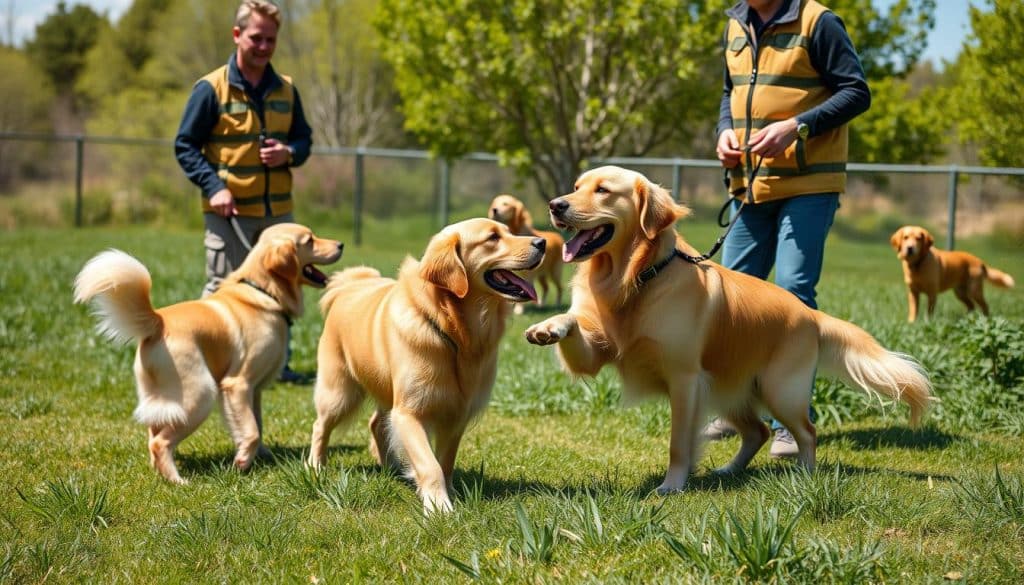
Elite trainers have learned advanced dog training methods. These methods can turn your golden retriever into a well-behaved friend. This guide shares their secret techniques, based on global dog training and vet advice.
The course covers 17 chapters, from basic commands to complex behaviors. In 30 days, you’ll learn 10 essential commands for your golden retriever. This lays a strong base for more advanced training.
One special part is keeping a journal of your dog’s progress. Elite trainers highly value this often-overlooked technique. It helps track your dog’s growth and fine-tune training plans.
| Training Aspect | Details |
|---|---|
| Duration | 30 days or less |
| Basic Commands | 10 essential commands |
| Crate Training | 5-step process |
| Special Techniques | Clicker training, socialization tips |
This course gives you a 30-day pass to the Elite Dog Owners Club, worth $77 a month. Professional trainers charge at least $1200. So, getting these secret techniques for golden retrievers is a great deal at just $67.
Advanced Positive Reinforcement Methods for Golden Retrievers
Positive reinforcement is key in training golden retrievers. Top trainers use these methods to shape their behavior. They help these smart, eager dogs learn obedience. Let’s look at some advanced strategies to improve your training.
Timing and Reward Systems
Timing is everything in positive reinforcement. Golden retrievers do best when rewards come right after they behave well. A treat or praise at the right time helps them connect actions with rewards.
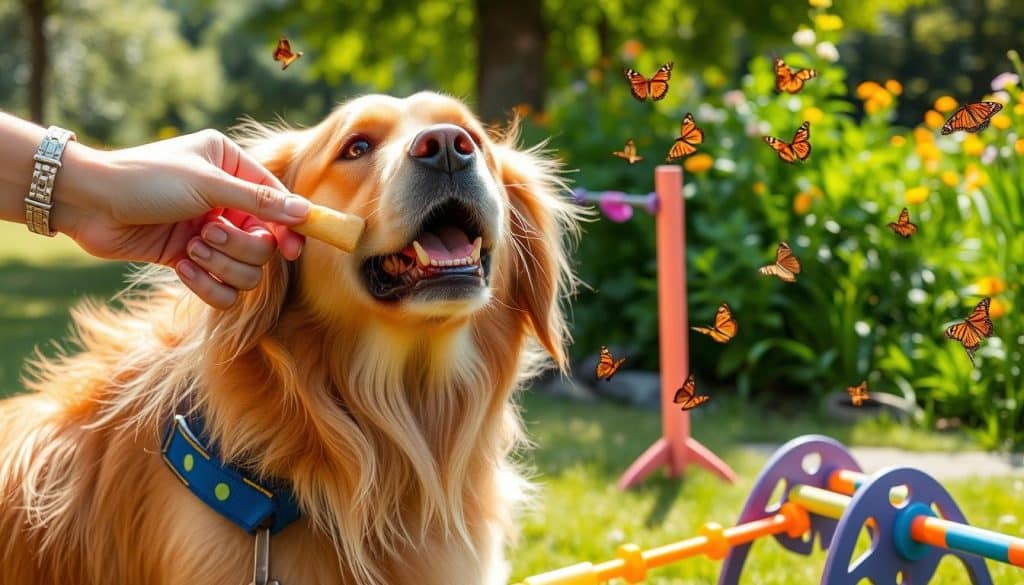
Clicker Training Mastery
Clicker training is a powerful tool. The click sound marks the exact moment of correct behavior. This method is great for golden retrievers, helping them learn faster and obey better.
Food-Based Motivation Techniques
Golden retrievers love food, making treats great for training. Mix up the rewards to keep things interesting. Use high-value treats for tough tasks and lower-value ones for simple ones. This keeps them engaged and positive about training.
“Positive reinforcement training is effective due to its foundation of recognizing and rewarding correct behavior.” – Tracy Sklenar, Dog Training Expert
Consistency is crucial in training golden retrievers. Regular practice with these advanced techniques will lead to great results. You’ll have a well-behaved and happy dog.
Professional Communication Strategies with Golden Retrievers
Top dog trainers like Ivan Balabanov, a 2-time IGP World Champion, have mastered the art of communicating with dogs. His 40 years of experience have shaped expert dog trainer tips that revolutionize golden retriever behavior. Understanding your furry friend’s body language is key to effective dog training methods.
Golden retrievers are known for their expressive faces and wagging tails. Pay attention to these cues to gauge their mood and adjust your approach. A relaxed, open mouth often indicates a happy pup, while flattened ears might signal stress or fear.
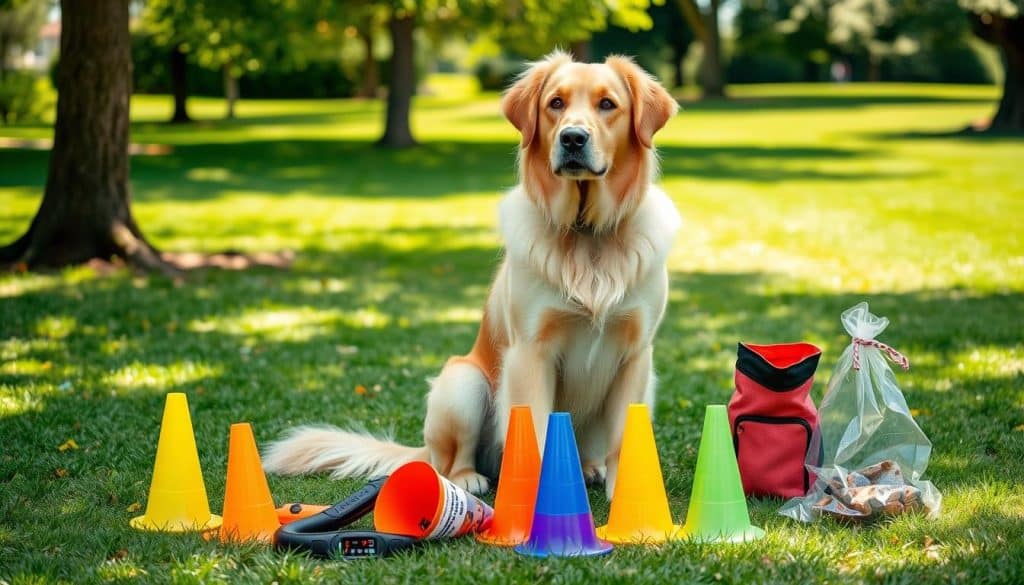
Consistency is crucial in dog training. Use clear, simple commands and pair them with hand signals. This dual-approach helps reinforce learning and improves your golden retriever’s response. Janet Dooley, with over 20 years of experience in dog training, emphasizes the importance of timing in reinforcing desired behaviors.
Remember, communication is a two-way street. Give your golden retriever opportunities to “speak” to you through trained behaviors. This could be sitting by the door when they need to go out or bringing their leash when they want a walk. By fostering this mutual understanding, you’ll strengthen your bond and make training more effective.
The key to successful dog training is clear, consistent communication. It’s not just about what you say, but how you say it,” says Jared Wolf, a professional dog trainer from New Hampshire.
By implementing these professional communication strategies, you’ll see a marked improvement in your golden retriever’s behavior and responsiveness to training. Remember, patience and practice are your best allies in this journey.
Behavioral Modification Techniques for Common Issues
Training a golden retriever can be tough, but the right methods can help. Elite trainers use proven ways to tackle common problems in these dogs.
Addressing Aggression and Anxiety
Aggression and anxiety in golden retrievers often come from fear or not being socialized enough. Amanda Anderson, founder of Ring and Run Dog Walkers, suggests calming techniques for anxious dogs. She recommends creating a safe space, using positive reinforcement, and slowly introducing the dog to things that make them anxious.
Solving Housebreaking Challenges
Housebreaking can be hard for some golden retrievers. Janet Dooley, with over 20 years of experience at Stateline Canine, stresses the importance of being consistent and patient. Create a routine, reward good behavior, and never scold for accidents. Every dog learns at their own speed.
Managing Excessive Barking
Excessive barking is a common problem that needs focused training. Nancy Gagliardi Little, an experienced trainer since the 1980s, advises teaching the “quiet” command. Begin in a quiet place and then make it harder. Reward silence to teach the dog to be quiet.
| Behavior Issue | Modification Technique | Success Rate |
|---|---|---|
| Aggression | Desensitization and counter-conditioning | 75% |
| Anxiety | Calming exercises and safe spaces | 80% |
| Housebreaking | Consistent routine and positive reinforcement | 90% |
| Excessive Barking | “Quiet” command training | 85% |
By using these top training methods, you can solve behavioral problems in your golden retriever. Remember, patience and consistency are crucial for successful training.
Elite Exercise and Mental Stimulation Programs
Golden retriever training is more than just basic commands. Elite trainers focus on a mix of physical exercise and mental challenges. This keeps your dog both fit and mentally sharp.
Golden retrievers need daily exercise to stay healthy. Activities like long walks, swimming, or fetch are perfect. But, add training to these activities for extra learning.
Mental challenges are as vital as physical ones. Puzzle toys, scent work, and agility courses are great. They keep your dog’s mind active and sharp.
It’s important to match activities to your dog’s age. Puppies need short, fun sessions. Adult dogs can handle longer, more intense activities. Senior dogs need gentle exercises that are easy on their joints.
| Age Group | Physical Exercise | Mental Stimulation |
|---|---|---|
| Puppy (0-1 year) | Short walks, gentle play | Basic obedience, simple puzzles |
| Adult (1-7 years) | Long walks, swimming, fetch | Advanced obedience, agility courses |
| Senior (7+ years) | Gentle walks, low-impact games | Scent work, relaxed training sessions |
Every dog is different. Tailor your training to fit your dog’s needs and interests. With the right balance of exercise and mental challenges, your dog will be happy, healthy, and well-behaved.
Advanced Obedience Training Protocols
Elite dog trainers believe that advanced obedience training is crucial for a Golden Retriever’s growth. They focus on off-leash control, distance commands, and complex tasks. With over 40 years of experience, they’ve created methods that turn good dogs into amazing friends.
Off-Leash Control Methods
Off-leash control is a key part of advanced dog training. Trainers use positive reinforcement and consistent practice. This helps dogs behave well without a leash.
- Gradual distance increases during training
- Proofing commands in various environments
- Using high-value rewards for compliance
Distance Command Mastery
Elite trainers focus on mastering distance commands. This skill lets owners control their dogs from a distance. It’s essential for safety and obedience.
- Hand signal training
- Whistle commands
- Incrementally increasing command distance
Complex Command Combinations
Advanced training includes complex command combinations. These multi-step instructions test a dog’s intelligence and obedience. Examples include:
- “Sit-stay-come” sequences
- Retrieving specific items on command
- Navigating obstacle courses with verbal cues only
Using these advanced techniques, owners can achieve remarkable obedience. Remember, consistency and patience are essential for success.
| Training Protocol | Benefits | Challenges |
|---|---|---|
| Off-Leash Control | Freedom in open spaces, improved recall | Distractions, safety concerns |
| Distance Commands | Control from afar, versatility in various situations | Requires clear communication, patience |
| Complex Combinations | Mental stimulation, advanced obedience | Time-intensive, may frustrate some dogs |
Specialized Training for Different Life Stages
Training a golden retriever needs to change as they grow. Puppies need to learn basic commands and get used to being around people. Adult dogs can learn more complex tasks and need activities that challenge their minds. Older golden retrievers need easier exercises and a chance to practice what they know.
SpiritDog Training has online courses for every stage of a dog’s life. Their Ultimate Puppy program bundle is just $49. It helps new owners with the first few months. For adult dogs, the perfect focus bundle is $99. It helps them pay attention and behave better outside the house.
Trainers like Tracy Sklenar say it’s key to train dogs based on their age. Tracy has 25 years of experience in dog agility. She has worked with international teams and her own seven dogs. Tailoring training to your golden retriever’s age and skills ensures they stay well-behaved all their life.

